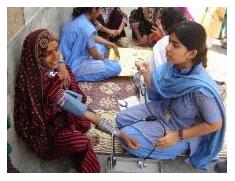Urban Health Program
Aga Khan University
The Urban Health Program is an innovative and long-standing program run by Aga Khan University’s Department of Community Health Sciences that provides basic health care and support in resolving socio-economic issues to select squatter settlements in Karachi. Aga Khan University founded the program in 1985, when public health efforts received little attention from other Pakistani universities.
The Urban Health Program presents an integrated model of primary health care and social development in the squatter settlements of Sultanabad and Rehri Goth. The program has based much of its work on an analysis of these communities’ needs; a comprehensive baseline survey was conducted by AKU medical students and faculty in 1996 with special emphasis on mother and child health. Keeping in view the needs of people in these areas, a primary health care program was developed in partnership with the communities. As a core university program, it now provides an excellent, continuing and replicable learning experience for faculty, staff and students in developing and sustaining mutually beneficial partnerships with community groups in selected squatter settlements in Karachi.
The program has focused not only on providing health services such as preventive and curative care, especially for expectant mothers and children, raising health awareness and the provision of essential medicines, but has also worked on development issues. Education has been encouraged by establishing community-based schools in the settlements – particularly for girls. Organizations within the community have been supported to improve literacy rates, reduce the incidence of illness and death among children and women, increase the mobility and social engagement of women, and make use of micro-credit schemes. Community activists have been assisted in advocating with local authorities to improve municipal services and infrastructure, and specially sanitation, in these settlements. The program has also facilitated links between the communities and other government and civil society organizations.
Community members, particularly women, have been encouraged to volunteer with the program, gaining marketable skills and enhancing their awareness about health and other social issues. In the process, people have learnt the ethic of voluntary service and gained the expertise that has provided opportunities for employment. Most on-going activities are now being continued by the communities through their own resources.
The program also gives students from AKU and other institutions invaluable experience of community dynamics and knowledge of the socio-economic determinants of health and disease. Dr Yousuf Memon, the Principal Coordinator of the Urban Health Program, says that too often, medical students in Pakistan only have the experience of working within public hospitals. AKU wants to “train doctors for people from different sections of society”. By working with the Urban Health Program, students learn about the health problems and challenges faced by the poor. They gain experience providing counseling, health education, nutrition, health screening, and child and maternal health services. They also undertake research to identify and better understand the challenges facing individual communities.
After the establishment of the Department of Community Health Sciences, with a mandate to help develop community-based knowledge and skills among students, many other medical schools in Pakistan have used a similar approach to public health work. Indeed, the program is a model for sustainable university-based civic engagement programs. Many graduates, inspired by their hands-on work through the Urban Health Program, now serve in ministries of health or find other ways to continue their commitment to public health and poverty alleviation. The $5,000 monetary prize will be used to further the program’s inspiring work.
Learn more at the Urban Health Program website>>